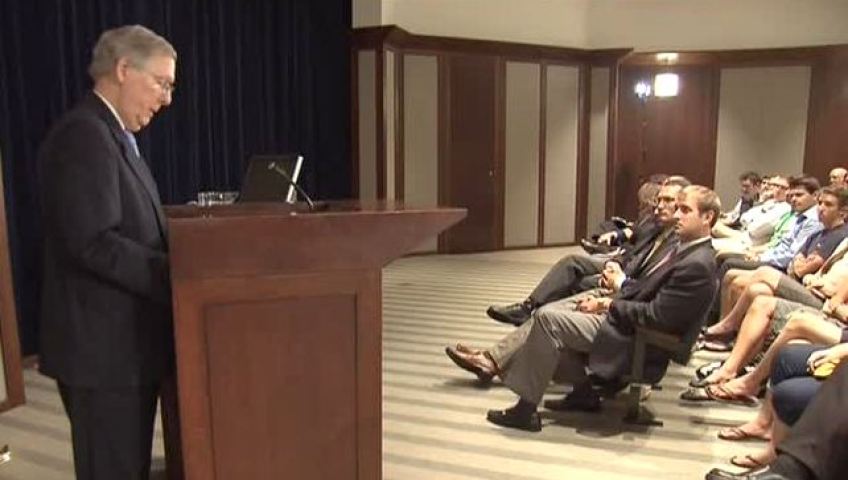To hear Sen. Mitch McConnell tell the story, Louisville attorney and Republican Thruston Morton owed a good part of his political career to a decades-long feud between two of Kentucky’s Democratic icons.
So how did the bitter rivalry between Albert “Happy” Chandler and Earle Clements help Morton secure two terms as a U.S. senator?
McConnell recounted that history to an audience at Transylvania University last November.
A Feud Is Born
Chandler and Clements both hailed from Western Kentucky, both were accomplished athletes, both served as governors of and senators for the state, and both had a politician’s gift for remembering names, according to McConnell.
But that’s where their similarities end.
Chandler was born into poverty in 1898 in Henderson County and raised by his father on the family’s hardscrabble farm. After college and law school, Chandler settled in Versailles to work as an attorney and high school football coach. He served two years in the state Senate before being elected as lieutenant governor in 1931. Four years later, Chandler set his sights on winning the top job in the commonwealth. McConnell describes Chandler as a charismatic, larger-than-life character who had a zest for campaigning.
Born in 1896, Clements was raised in Morganfield, where his father was farmer, lawyer, and local politician. After college and Army service in World War I, Clements won a succession of local elections in Union County, serving as sheriff, county clerk, and county judge-executive. As Clements rose through the Democratic ranks, McConnell says he gained a reputation as a great political organizer and strategist. At the same time, he says Clements could be inscrutable, temperamental, and a campaigner whose stump speeches were labeled “masterpieces of mediocrity.”
The rivalry between the two men started with the gubernatorial election of 1935. In the Democratic primary, Lt. Gov. Chandler faced state Highway Commissioner Thomas Rhea and his campaign manager, Earle Clements. Chandler prevailed in the bitter contest and was elected governor that November.
“This pitting of Chandler versus Clements in the 1935 race started a political feud that would have a profound impact on Kentucky politics for more than a quarter century,” McConnell says. “It did so by crystallizing factionalism within the state Democratic Party.”
Factional Opposition and Payback
Chandler had a well-regarded four years as governor, then went on to serve in the U.S. Senate and as commissioner of Major League Baseball. Clements went on to become a state senator, congressman, governor, and U.S. senator.
In 1955, McConnell says Chandler decided to run for a second term as Kentucky governor and faced Eastern Kentucky judge Bert Combs in the Democratic primary. Combs was backed by the Clements faction of the party, which led to another bitter primary battle. And again Chandler prevailed.
The next year, Clements was up for re-election to his U.S. Senate seat. Clements had thrived in the chamber during his first term, rising to become Democratic whip under Minority Leader Lyndon Johnson.
But Chandler was looking for payback after the stiff primary challenge he faced the year before at the hands of the Clements faction of state Democrats. Chandler withheld his faction’s support for Clements’ re-election bid, which gave Republican Thurston Morton the opening he needed to win the election that fall.
That was the only time Clements lost an election, McConnell says. Clements would never hold public office again, but he did get the satisfaction of seeing his faction’s rising star, Bert Combs, defeat Chandler’s proxy in the 1959 race for governor.
Republican Benefits from Democratic Split
“Whereas Chandler was exuberant and folksy, and Clements was serious and sphinx-like, Morton was urbane with a sly sense of humor,” McConnell says of his fellow Republican.
Morton had a wealthy upbringing and attended a Virginia prep school and Yale University before returning to Louisville to work in his family’s milling business. After serving in the Navy during World War II, Morton won three terms in Congress, managed John Sherman Cooper’s 1952 senatorial campaign, and worked in the Eisenhower administration.
When the GOP sought a candidate to run against Clements in the 1956 Senate race, Eisenhower encouraged Morton to enter the contest. McConnell says Morton didn’t think he stood a chance of winning the seat because he saw himself as an East Coast-educated sophisticate from Louisville trying to run his first statewide campaign in rural Kentucky.
But thanks to the split between the Chandler and Clements factions of the Kentucky Democratic Party, Morton won–by fewer than 7,000 votes.
And it wouldn’t be the last time Chandler Democrats helped hand Morton a victory. In his 1962 re-election campaign, the Republican faced Lt. Gov. Wilson Wyatt, a former Louisville mayor. Chandler, who was positioning himself to run for a third term as governor in 1963, opposed Wyatt.
Morton won a second term by almost 50,000 votes, yet Chandler ended up losing his gubernatorial bid.
In addition to his Senate duties, Morton also chaired the national Republican Senatorial Committee. McConnell says the usually hawkish Morton sent shock waves through Washington when in August 1967 he announced his opposition to President Johnson’s handling of the war in southeast Asia. Morton retired from the Senate in 1968.
McConnell says the feud that defined Kentucky Democratic politics for more than a generation helped end the political career of Earle Clements and launched Morton to the national stage in politics. Morton died in 1982, followed by Clements in 1985, and Chandler in 1991.
“The rivalry between Chandler and Clements is a vivid illustration of the principle that the personal and the political are often inextricably intertwined,” McConnell says.


